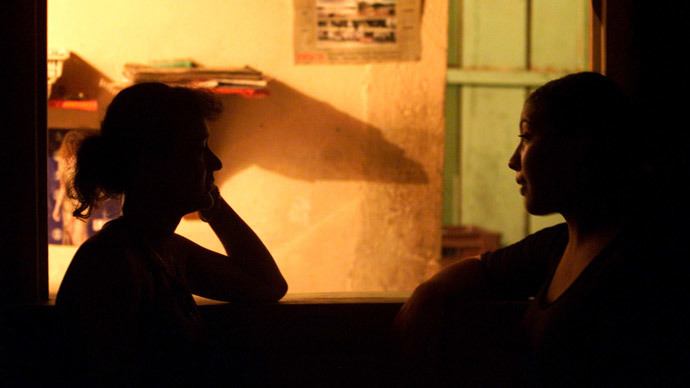‘Comfort women’: a historical hook that continues to bully Japanese-S. Korean relations

Two of Asia’s strongest nations – Japan and South Korea – continue to be victims of history. There is no reconciliation over the issue of comfort women - Korean women working as sex slaves for the Japanese Army during World War II.
Relations between Japan and South Korea seem to be haunted by one of the most profound legacies of World War II, the ‘comfort women’ comprising about 200,000 women, mostly Korean, believed to have been forcibly recruited as prostitutes for the Imperial Japanese Army.
After decades of silence, 234 former comfort women came forward in the 1980s to tell their stories of the torture they endured. According to reports about 25-30 percent are believed to have survived the ordeal at “comfort stations” where these women testified they had been raped up to 40 times a day.
South Korea, which was under Japanese rule from 1910-1945, feels a “genuine” state apology is needed, whereas Japan claims it has done the best it could.
In 1993 the then Japanese Chief Cabinet Secretary Yohei Kono issued the Kono Statement which apologized for the immeasurable pain caused to the comfort women and also affirmed that many of them were employed through coaxing, coercion, with the administrative/military personnel directly involved in their recruitment.
The statement did not go down well with Japanese nationalists who challenged the claim that these women were ‘physically coerced’ by Japanese officials.
During his first stint, PM Shinzo Abe, denied that Japan’s military had any role in coercively recruiting these women. There was speculation he may revise the Kono Statement. A major discord surfaced when in 2013 PM Abe visited the Yasukuni Shrine that commemorates war dead – a gesture detested by South Korea as a past victim of Japanese militarism.
Fearing a possible fall out, during the Nuclear Security Summit in The Hague this year, the US organized a meeting between South Korea and Japan - America’s two strongest allies in Asia. The summit concluded with Abe announcing the Kono Statement to continue as is.
However, Abe’s cabinet went ahead and announced a review of the drafting process of the Kono Statement, and on June 20 released a report stating that the content in the statement was drafted jointly by both nations, perhaps hinting at a probable ‘Korean influence’ on the statement.
History sanitized
Known to be an outspoken nationalist, “national pride” is at the heart of Abe’s governance. Certainly any allegation of the Imperial Army forcing women into sexual service is a huge stigma on the history of the past glory that Abe might want to portray.
As Tessa Morris – Suzuki, Professor of Japanese History at Australia National University says, “Abe's goal for a long time has been to ‘re-educate’ the Japanese and international public into believing a sanitized version of the ‘comfort women’ history. According to this history, there was no forced recruitment of women by the Japanese military, and Japan's behavior was no different from that of other countries in wartime. The current Japanese government has a generally ‘denialist’ approach. Although Abe has not yet officially abandoned the Kono statement, his government has been working very hard to undermine its credibility.”
This nationalistic approach has been further reaffirmed with Asahi Shimbun, one of the five national newspapers in Japan, retracting its articles carried during the eighties and nineties which recognized that “comfort women” were indeed forced into sexual slavery based on the narratives of a person named Yoshida Seiji, who claimed he had coerced women on the island of Jeju into service.
The newspaper said that many of Seiji’s accounts were faulty. Interestingly the retraction came following the criticism from the conservative intelligentsia, and also the Abe government, who allege that the accounts of comfort women are demeaning Japan’s image globally.
After the Asahi withdrawal, Japan demanded a revision of the 1996 UN report, which described the comfort women system as “military sexual slavery.” It was compiled by Radhika Coomaraswamy, a former special rapporteur on violence against women at the U.N. Human Rights Commission. Coomaraswamy is said to have declined to revise the report stating that the Seiji reference was only one part of the evidence.
Some are of the view that Japan should not be singled out when there has been evidence of state backed brothels across the globe. In fact there are reports of American troops, after the Japanese surrender, frequenting the comfort stations. They reject phrases like “sex slaves” and “sexual slavery” given to the comfort women system, with some calling them “professional prostitutes.”
Suzuki adds though Japan was certainly not the only country to run military brothels, its wartime "comfort station" system was exceptionally large in scale, and there is abundant evidence that some (though not all) of the "comfort women" were forcibly recruited by the Japanese military and their agents.
Impending gestures
Dismissing the matter by merely calling them “professional prostitutes,” experts feel , is actually dishonoring a set of people who felt violated with the treatment history has meted out to them. As Prof. Jeff Kingston of Temple University, Japan Campus, says, “They (comfort women) would like their dignity restored by a direct official apology not the arms length AWF (Asian Women’s Fund:1995-2007) that was an equivocal gesture established by Japan to make amends but avoid any legal responsibility.”
The non-governmental Asian Women’s Fund was set up to compensate former “comfort women,” however the Japanese government refused to associate with it directly.
One of the surviving victims, Yi Ok-seon who was abducted at 15, has been quoted saying, "We want the Japanese Emperor to come here, kneel before us and apologize sincerely. [But] I think the Japanese are just waiting for us to die."
According to Suzuki, “Some former comfort women accepted letters of apology written by former Prime Minister Junichiro Koizumi, along with contributions made on the basis of the Kono statement, but others rejected these because there was no explicit compensation paid by the Japanese state. They felt that the apology did not adequately acknowledge the gravity of the wrongs inflicted on them. For almost all the women, I believe, the core issue is a really full apology by the Japanese state (not just by individual politicians) and a demonstrated determination by the Japanese state to teach the truths of wartime history to future generations.”
The South Korean government, on the other hand, has from time to time used historical conflicts with Japan to stir nationalistic sentiment, Suzuki said.
This is evident from the recent memorial hall constructed by China, at the request of South Korean President Park Geun-hye during her Beijing visit in 2013, to commemorate the Korean nationalist Ahn Jung-geun who had assassinated by the Japanese Governor General of Korea Hirobumi Ito on Oct. 26, 1909. The memorial is situated in the Chinese city of Harbin where the assassination took place.
While Tokyo expressing“regret” over the memorial called Mr. Ahn a “terrorist,” South Korea responded by calling Japan a “terrorist state.”
Suzuki adds, “It is also influenced by a decision of the Korean Supreme Court which ruled in 2011 that the South Korean government's failure to negotiate a just solution to the problem with Japan infringes the basic human rights of the victims (comfort women) and violates the Constitution.”
In the meantime, the last surviving former comfort women, little more than 50 of them, are getting very old. Unless Japan and South Korea agree to a resolution soon, the historical fissure will have to be borne by generations to come.
However Kingston sees very little chance of the historical controversy getting resolved “because Japan won’t go far enough and Koreans are not inclined to ever let Japan off the hook of history.”
The statements, views and opinions expressed in this column are solely those of the author and do not necessarily represent those of RT.
The statements, views and opinions expressed in this column are solely those of the author and do not necessarily represent those of RT.













